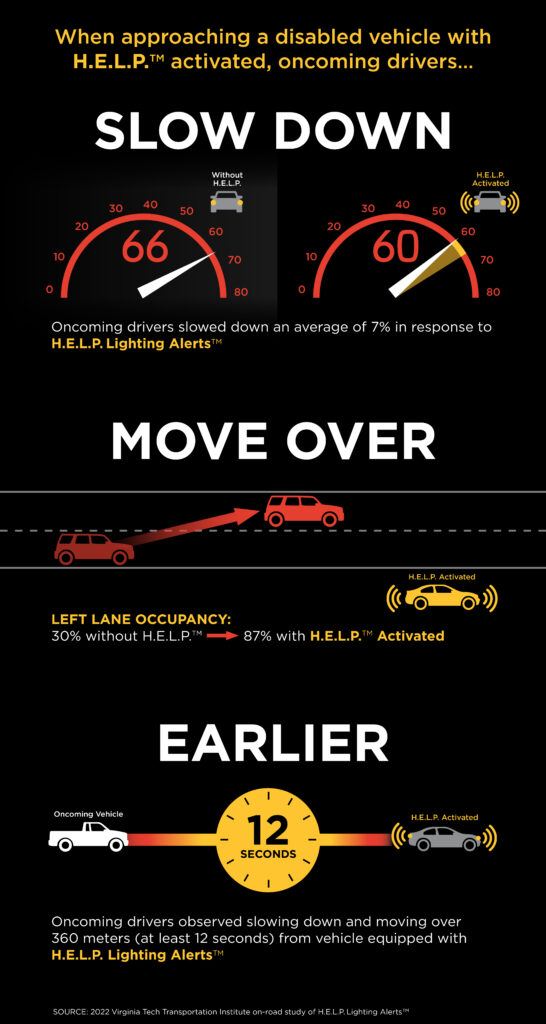Virginia Tech Study Confirms Higher Frequency Hazard Lighting Provides Significant Safety Improvement Over Traditional Hazard Lights
Drivers slow down and move over much sooner vs. traditional hazard lighting, which hasn’t changed in 71 years
A new on-road study conducted by Virginia Tech Transportation Institute (VTTI) found that more obvious and visible hazard lighting improved advance warning to oncoming drivers – resulting in direct driver responses that help to prevent crashes into disabled and vulnerable vehicles and their occupants.
The study was commissioned by Emergency Safety Solutions, Inc. (ESS), creators of the Hazard Enhanced Location Protocol (H.E.L.P.™️) solution, which revolutionizes the hazard warning system to address a severe, newly discovered roadway safety problem in America and around the world.
The real-world study, conducted on an active public highway, measured drivers’ reactions to H.E.L.P.TM Lighting Alerts flashed from a “disabled” test vehicle stopped on the shoulder of the road. The test measured the average speed, deceleration, lane changes and in-lane deviations of hundreds of oncoming vehicles in response to the test vehicle’s standard hazard flashers versus H.E.L.P.’s sharper and faster flash rates from the same original equipment lamps.
Significant driver response to H.E.L.P.™ Lighting Alerts included:
- Drivers Slow Down – Oncoming drivers decelerated at a greater rate and at a substantially further distance away than drivers approaching the same test vehicle using normal hazard lights.
- Drivers Move Over – Oncoming drivers changed lanes, typically moving a full lane away from the “disabled” test vehicle at observed distances of up to 360 meters, or nearly four football fields away.
- Drivers Respond Earlier – Most approaching drivers decelerated and moved over a lane before crossing the farthest observation checkpoint of 360 meters, which translated to more than 12 seconds of observed advance warning / reaction time.
“Our findings show that higher flash rate hazard lights are significantly more effective than standard hazard lights in prompting safer behaviors among oncoming drivers approaching a disabled vehicle,” said Dr. Ronald Gibbons, Director of the Center for Infrastructure Base Safety Systems at VTTI. “Drivers noticed the lights earlier, giving them more time to slow down and in most cases, move over a full lane.”
Crashes into disabled and vulnerable vehicles are a deadly and growing safety problem. Every seven minutes someone is involved in a disabled vehicle crash on U.S. roadways, per an 11-year study of government crash data by Impact Research Inc. Nearly 72,000 people are affected each year – with 15,000 of them resulting in injury or death. The data also reflects a substantial equity issue, with 80 percent of fatal victims coming from households earning under the U.S. median income level. In addition, the data shows that Black Americans are twice as likely as the general population to fall victim to a fatal disabled vehicle crash.
To overcome this troubling safety problem – which is growing at 10 percent per year – ESS created its H.E.L.P.TM solution, a regulatory-compliant safety communications feature that provides multiple layers of enhanced protection for disabled vehicles, their occupants and other roadway users including:
- H.E.L.P.™ Digital Alerts – Notifications sent to oncoming drivers through their in-vehicle dashboard displays and GPS mapping apps, such as Waze and Apple Maps, providing advance warning that they are approaching a disabled vehicle, even beyond line of sight.
- H.E.L.P.™ Lighting Alerts – Dramatically improved, enhanced hazard flash pattern that is scientifically-tuned and proven to grab the attention of oncoming drivers and prompt them to slow down and move over a lane.
- Intelligent Controls – H.E.L.P.™ deploys automatically when conditions indicate a safety need, such as a collision, tire blowout, driveline failure or inattentive driver takeover (autonomous driving application). Drivers can also activate H.E.L.P. ™ manually when the hazard signal is engaged, and the vehicle is in Park.
ESS is working with automakers to deploy H.E.L.P.™ globally in passenger vehicles as an original equipment safety feature and as an accessory product for existing personal and fleet vehicles. In addition, ESS is actively working with commercial fleet operators to implement H.E.L.P. DeliverSAFETM on long-haul and last-mile commercial delivery vehicles.
In direct alignment with several objectives laid out in the U.S. Department of Transportation’s National Roadway Safety Strategy (NRSS), the 2021 Infrastructure Investment and Jobs Act (IIJA) provides federal support for the deployment of these types of advance warning features. Specifically, a section of the law entitled “Preventing Roadside Deaths” provides policy support and certain funding for the deployment of vehicular countermeasure technologies including “optical visibility measures, to increase the visibility of stopped and disabled vehicles.”
“The only way to prevent these kinds of crashes, which kill or injure more than 40 people every day in the U.S., is to ensure approaching drivers notice disabled vehicles and react much earlier so they can safely avoid them,” said David Tucker, Founder and CEO of ESS. “With H.E.L.P. lighting and digital alerts, we are revolutionizing the hazard warning system – which has gone more than 70 years without innovation or improvement – to provide multiple layers of protection to some of the most vulnerable people on our roadways.”
Category: Accessories, Cab, Trailer & Body, Driver Stuff, Equipment, Featured, Fleet Diagnostics & Software, Fleet Maintenance, General Update, News, Products, Safety, Shop Stuff, Tech Talk, Vehicles











